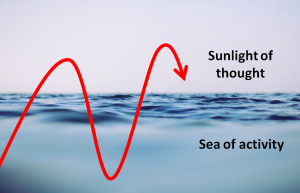 Sometimes the gap between people seems so big that no common ground exists, no collaborative solution possible.
Sometimes the gap between people seems so big that no common ground exists, no collaborative solution possible.
Sort of like the current gap between U.S. Democrat and Republican politicians, negotiating the national debt? Or maybe the gap in a project team, in which teamwork is just a notion? Or, maybe the gap between businesses, or family, involved in a dispute?
And yet, individuals, organizations, and communities do find ways to reduce the gap, build consensus, and reach agreement.
One of the best habits to foster, for reducing the gap, is a learning mindset.
A learning mindset aims to integrate thinking and doing. We have thoughts. We act on them. We get feedback. We adapt… move closer, reduce the gap.
The way to getting it done, say Roger Fisher & Alan Sharp, is to integrate thinking and doing, the sunlight of thought with the sea of activity. An iterative process, incremental, one step at a time, is usually the shortest path to success, resolution, and reducing the gap.
And this learn as you go approach is not just about learning from our mistakes. It might be better to learn from success, you know what worked, you can do it again, and the next time you’ll probably do it even better. That’s the philosophy throughout ReWork, a wonderful little book by the authors of the 37signals suite of software products, and one of my favourite how-to reads of this year.
In learning organizations; prototyping, experimenting, piloting, are ways to integrate thinking and doing. In your community, there are likely many ways. And, as individuals, we do the same; try things out, get traction from what worked, build our future, one step at a time.
Integrating thinking and doing is an adaptive strategy. In living systems, it equates with survival. In uncertain times, is there any other way?
What say you, is there a better way to reduce the gap?
[Leave a comment about this post. Subscribe to the feed to get regular updates.]

Your question is an interesting one, Ben, and has sparked yet more questions for me. I’ve posted some thoughts relating specifically to the distance family mediation context on our project’s blog at: http://distancemediation.ca.
Hey, thanks Susanna. I’m glad you’re building on the conversation. I’ll check out your blog, too.